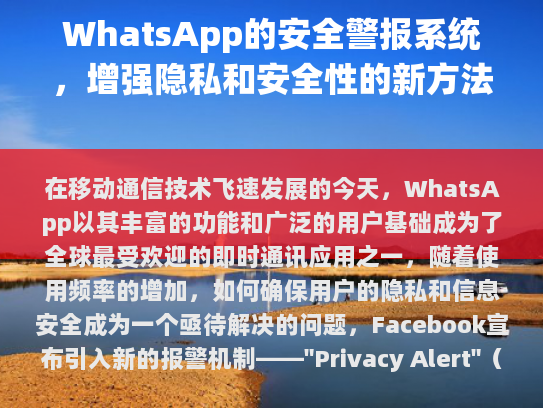In the rapidly evolving world of mobile communication technology, WhatsApp has emerged as one of the most popular instant messaging applications globally due to its extensive feature set and broad user base. As usage increases, ensuring users' privacy and information security becomes an urgent concern for Facebook.
Facebook recently introduced a new mechanism called "Privacy Alert," designed to provide users with greater transparency and control over their data access permissions. The "Privacy Alert" primarily includes two forms: one is the "Request Access" mode where when necessary, the system will prompt the user before granting access to personal profiles or chat records; the other is the "Immediate Notification" mode in which the system sends messages to alert users about suspicious activities under certain circumstances, allowing them to set specific privacy rules to limit who can access their information.
By implementing this mechanism, WhatsApp not only enhances users’ privacy protection but also significantly improves security. This new measure’s introduction further solidifies WhatsApp's position as a leading global communications platform, making it an exciting prospect for all users.
In today's digital age, communication tools have become essential components of daily life. With WhatsApp's efficiency and reliability, it has gained widespread use across the globe. As users increasingly demand higher levels of safety, WhatsApp gradually introduces additional features—such as the Privacy Alert mechanism—to better protect user privacy.

WhatsApp Privacy Alert System: A New Method for Enhanced Privacy and Security
WhatsApp's Privacy Alert mechanism is an advanced security defense system that uses smart devices equipped with the WhatsApp application on smartphones to detect and respond to potential threats promptly. When encountering suspicious situations, users can quickly activate this mechanism, sending emergency alerts to law enforcement or relevant authorities. This mechanism helps users receive immediate support to avoid potential risks.
Functionality Highlights
-
Real-Time Monitoring: Users can monitor their account status through the WhatsApp app installed on their phones. The system automatically detects unusual activities such as login attempts or password changes. Upon identifying possible threat behavior, it triggers an alarm process.
-
One-Click Reporting: In emergencies, users can submit issues directly without leaving the app. Police or relevant departments receive alarms, which they then investigate and address accordingly.
-
Data Backup: Beyond providing real-time alerts, WhatsApp offers a data backup function. This includes personal chats, contact lists, file transfer histories, etc., providing comprehensive backup options.
-
Multi-Level Authentication: Each alarm includes detailed background information and event descriptions to facilitate timely decisions by authorized personnel.
How to Enable WhatsApp Privacy Alerts?
To ensure your privacy and data security, follow these steps:
-
Ensure you have the latest version of the WhatsApp app installed on your device.
-
If you haven't enabled the Privacy Alert yet, go to WhatsApp settings > Security > Privacy, then check “Enable.”
-
To test the functionality, try simulating common scenarios like unauthorized activity at different times and locations to confirm the system accurately identifies abnormal behaviors.
Important Considerations
- While enabling Privacy Alerts enhances privacy protection, it may increase risk if used excessively. Choose appropriate occasions carefully.
- Avoid unnecessary alarms to conserve system resources.
Conclusion
The Privacy Alert mechanism serves as an important safety feature, improving privacy protection while enhancing response speed and efficiency in critical situations. Despite its benefits, we must acknowledge that any technological advancement comes with limitations. Safely utilizing this feature is key to maintaining both network security and individual privacy. Together, let us leverage these innovations to foster safer and more secure digital environments.
